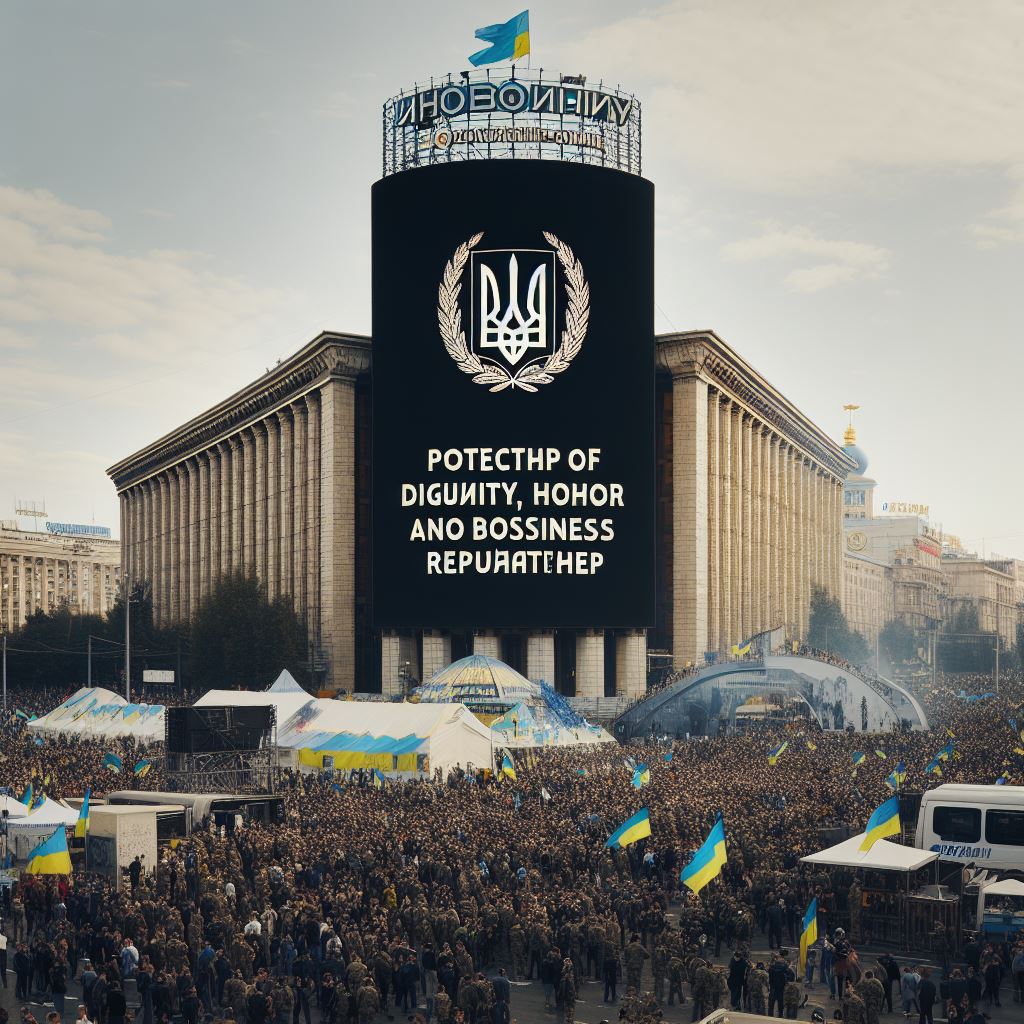Protection of dignity, honor and business reputation
According to Article 68 of the Constitution of Ukraine, everyone is obliged not to encroach on the rights and freedoms, honor and dignity of other people. Everyone in Ukraine has a duty not to spread false information about a person and such information that disgraces his dignity, honor or business reputation.
Dignity and honor are the inviolable rights of every individual. These concepts are defined as moral and ethical categories, as well as personal non-property rights, which the law grants the properties of independent objects of judicial protection.
Dignity means recognizing the value of each physical person as a unique biopsychosocial value. Every person deserves self-respect.
Honor is associated with a positive social assessment of a person in the eyes of others. It is based on the conformity of actions (behavior) with generally accepted ideas about good and evil.
The business reputation of an individual reflects the public assessment of his business and professional qualities in the performance of labor, service, public or other duties.
The business reputation of a legal entity is an assessment of its entrepreneurial, public, professional or other activities carried out by such a person as a participant in public relations.
About special methods of protection in case of encroachment on honor, dignity and business reputation
The Constitution of Ukraine guarantees everyone judicial protection in case of interference in his personal and family life. At the request of a person, a court in Ukraine guarantees the realization of the right to:
1. Denial of false information about yourself and your family members.
2. Response to common information about a person.
3.Removing any information about yourself or your family members from public media space.
4. Prohibition of disseminating information about oneself or one's family members.
5. Compensation for property and moral damage caused by the collection, storage, use and distribution of inaccurate information.
The choice of the method of protection depends on the content of the violated right, the manner in which the right was violated, and the consequences of the violation of the right.
In the case of exercise of the right to refute disseminated information, the court recognizes the disseminated information as unreliable and obliges the person who disseminated it to disseminate a refutation of such unreliable information.
In the case of exercise of the right of reply, the person about whom the information was disseminated highlights his own point of view about the disseminated information without recognizing it as unreliable.
What is considered dissemination of information?
Dissemination of information is: its publication in the press, broadcast on radio, television or using other mass media; dissemination on the Internet or using other means of telecommunication; statements in characteristics, statements, letters addressed to other persons; messages in public speeches, in electronic networks, as well as in another form to at least one person.
Public dissemination of information can also be manifested through the placement of posters, slogans and other visual materials in public places, as well as the distribution of leaflets among the population that contain material that may negatively affect the dignity and honor of a specific person or enterprise, both physical and legal.
What information is considered unreliable?
Unreliable information is considered to be information that does not reflect reality or even contains false data. It can be information about events or phenomena that did not exist at all, or existed, but were presented incorrectly or incompletely.
Information that claims that a person has violated, in particular, the norms of current legislation or committed any other actions that contradict the principles of morality, generally accepted rules of coexistence or can be considered unethical behavior in personal, social or political life should be considered negative. This information may violate a person's right to respect for his dignity, honor or business reputation.
It is worth noting that in the event that the disseminated information that violates personal non-property rights is reliable, the demand for its refutation by the court is not satisfied. In addition, evaluative judgments are not subject to refutation and proof of truth.
What information are value judgments?
Evaluative judgments are statements that are not based on facts, but instead include criticism, evaluation of actions, or expressions of opinion. Also, evaluative judgments may include statements that cannot be considered as containing factual data, especially given the use of linguistic and stylistic devices such as hyperbole, allegory, or satire.
What is the statute of limitations in cases of protection of dignity, honor or business reputation?
The statute of limitations does not apply to claims for the protection of dignity, honor and business reputation, with the exception of the claim to refute false information published in the media.
It should be understood that in cases of protection of honor, dignity and business reputation, it is important to correctly choose the method of protection of violated rights and form claims, correctly identify the proper defendants in the case, draw up the necessary procedural documents in accordance with the procedural requirements and control the consideration of the case in the claim or in a separate proceeding.
Conclusion
Protection of honor, dignity and business reputation is an important component of the modern legal environment, where the information space and interaction between individuals are becoming more and more active. In the era of the digital era, when information is easily disseminated and can have a significant impact, the need to protect honor, dignity and business reputation becomes very urgent.
Through legal mechanisms, responsibility for the dissemination of inaccurate, offensive information, as well as ways to refute false statements, the state ensures the protection of personal non-property rights of any person.
Lawyers of the legal marketplace "Consultant" provide legal consulting services, general, carry out a legal analysis of the situation, form a legal opinion, provide protection in court and participate in court hearings in cases of protection against encroachments on the dignity, honor or business reputation of individuals and legal entities throughout the territory of Ukraine .
The author of the article will provide consultation, writing of the necessary procedural documents and representation of a lawyer in court in order to protect the rights and interests of both individuals and legal entities in cases of protection of dignity, honor and the right to inviolability of business reputation.
Do not hesitate to contact us for legal assistance in cases of protection of dignity, honor and business reputation.
Sincerely, the team of the legal marketplace "Consultant".




































